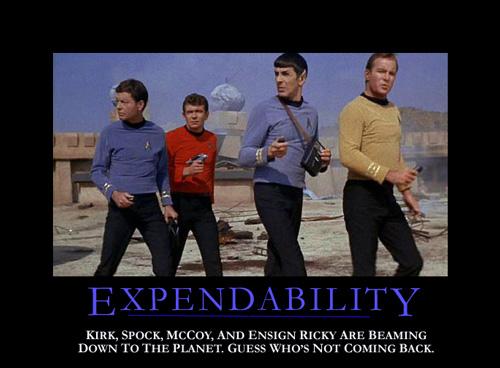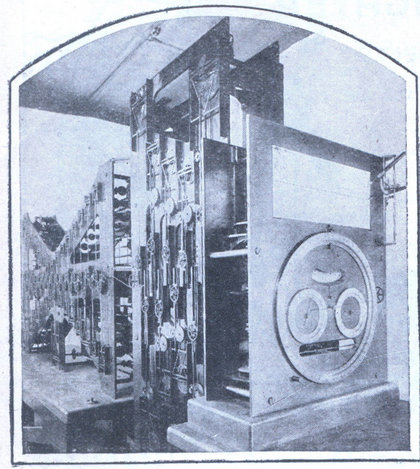
Monday, May 12, 2008
17 Stunning Auditoriums & Theatres From The Ancient World

Some of the most fascinating man-made structures on earth are the massive auditoriums that were once used for theatrical performances, music shows, as well for more sinister purposes such as violent wild animal shows and gladiatorial contests. These awesome theatres have a historical stigma attached to them, and in some cases, history is still being made because some are still being used today.
It's hard to believe that some of these theatres are close to 3,000 years old, and it's amazing that they're even still standing. The amount of engineering knowledge that our ancient ancestors had developed is just as mesmerizing especially when some of these auditoria rival present-day outdoor theatres in terms of acoustic properties. That's amazing for a 2,000 year old theatre that is large enough to seat 25,000 people or more!
- more -
The ultimate ethical meal: a grey squirrel
It tastes sweet, like a cross between lamb and duck. And it's selling as fast as butchers can get it
by Caroline Davies It's low in fat, low in food miles and completely free range. In fact, some claim that Sciurus carolinensis - the grey squirrel - is about as ethical a dish as it is possible to serve on a dinner plate.
It's low in fat, low in food miles and completely free range. In fact, some claim that Sciurus carolinensis - the grey squirrel - is about as ethical a dish as it is possible to serve on a dinner plate.
The grey squirrel, the American cousin of Britain's endangered red variety, is flying off the shelves faster than hunters can shoot them, with game butchers struggling to keep up with demand. 'We put it on the shelf and it sells. It can be a dozen squirrels a day - and they all go,' said David Simpson, the director of Kingsley Village shopping centre in Fraddon, Cornwall, whose game counter began selling grey squirrel meat two months ago.
- more -
How Food Riots, Pricey Gas and Home Foreclosures Point to a Better Future
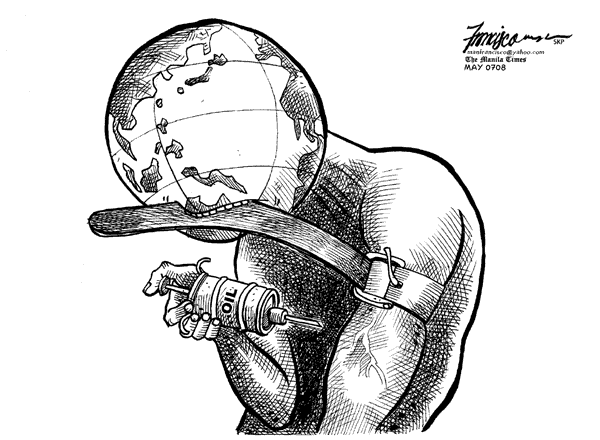
By Marjorie Kelly and Paul Raskin
Can anybody make sense of what the heck is going on today? A lead story in the news covers the rioting in Haiti and a half-dozen other nations as food prices soar. Another front-page column reports that the U.S. subprime mortgage crisis is seizing up credit markets worldwide and contributing to housing woes -- possibly even economic destabilization -- in Ireland, Spain, Britain and elsewhere. Other news reports the discovery of a huge fracture in Antarctica's vast Wilkins ice shelf, drawing attention to the slow-motion crisis of climate change. And there are ongoing reports about water shortages in Africa and Asia, droughts in Australia, sky-rocketing oil costs, the razing of the Amazon and images of war and terror.
Is the conjunction of these various crises simply a coincidence? The answer is no. From a historical perspective it is possible to see an overall pattern that connects the dots. What is unfolding today is a systemic crisis, heralding the beginning of a large-scale shift at the deepest levels of cultural organization. We are in transition -- for the first time in history -- to a tightly interconnected global system. We have entered the planetary phase of civilization, in a passage that may prove as significant as the advent of agriculture or the Industrial Revolution.
- more -
Environmental deal sets aside L.A.-sized tract
LEBEC, California (AP) -- A group of environmentalists and the owners of a large stretch of wilderness have reached a deal that would set aside the largest parcel of land for conservation in California history.

A deal between developers and conservationists preserves most of Tejon Ranch, a habitat for condors.
After years of legal tussles, conservationists including the Sierra Club have agreed not to challenge proposed development on the sprawling Tejon Ranch north of Los Angeles in exchange for close to 240,000 acres, in a deal to be announced Thursday.
At 375 square miles, the preserve of desert, woodlands and grasslands would be eight times the size of San Francisco and nearly the size of Los Angeles, said Bill Corcoran, the Sierra Club's senior regional representative.
"There is, in my opinion, no other place like it in California. It's unrivaled in the diversity of native wildlife and plants," said Corcoran, who helped negotiate the deal. "Tejon is key to us because it's the only place where the Sierra Nevadas, the coastal range and Mojave Desert and Central Valley all meet."
Tejon Ranch sits atop the Tehachapi Mountains, 60 miles north of Los Angeles, and is home to elk, wild turkeys, coyotes, bears and eagles, as well as a critical habitat for condors.
The Tejon Ranch Co. has been trying for years to develop three projects, or 10 percent of the 270,000-acre ranch, while appeasing environmentalists.
- more -
Leader of GOP convention quits after Myanmar ties reported
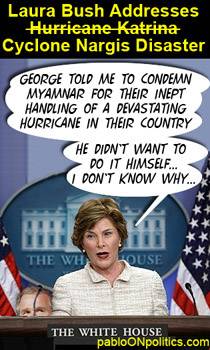
Coordinator of GOP convention quits after Newsweek report on his firm's ties to Myanmar junta
The man picked by the John McCain campaign to run the 2008 Republican National Convention resigned Saturday after a report that his lobbying firm used to represent the military regime in Myanmar.
Doug Goodyear resigned as convention coordinator and issued a two sentence statement:
"Today I offered the convention my resignation so as not to become a distraction in this campaign. I continue to strongly support John McCain for president, and wish him the best of luck in this campaign."
Goodyear, chief executive of lobbying firm DCI Group, resigned a few hours after Newsweek posted a story posted online that the company was paid $348,000 in 2002 and 2003 to represent Myanmar's junta.
- more -
Iraq: Will We Ever Get Out?
There is a working assumption among the American people that a new president enters the White House free of responsibility for the errors of the past, free to set a new course in any program or policy, and therefore free—at the very least in constitutional theory, and perhaps even really and truly free—to call off a war begun by a predecessor. No one would expect something so dramatic on the first day of a new administration but it remains a fact that the president is the commander in chief of the armed forces, and the power that allowed one president to invade Iraq would allow another to bring the troops home.
Barack Obama and Hillary Clinton in the current presidential campaign have promised to do just that—not precipitously, not recklessly, not without care to give the shaky government in Baghdad time and the wherewithal to pick up the slack. But Obama and Clinton have both promised that the course would be changed on the first day; ending the American involvement in the Iraqi fighting would be the new goal, troop numbers would be down significantly by the middle of the first year, and within a reasonable time (not long) the residual American force would be so diminished in size that any fair observer might say the war was over, for the Americans at least, and the troops had been brought home.
The presumptive Republican candidate, John McCain, has pledged to do exactly the opposite—to "win" the war, whatever that means, and whatever that takes. Politicians often differ by shades of nuance. Not this time. The contrast of McCain and his opponents on this question is stark, and if they can be taken at their word, Americans must expect either continuing war for an indefinite period with McCain or the anxieties and open questions of turning the war over to the Iraqi government for better or worse with Obama or Clinton. Which is it going to be?
- more -
Surging Into Chaos: Iraq After Basra
By ASHLEY SMITH
The trumpeted success of the Bush administration's surge was built on flimsy foundations. They were, principally, the employing of the Sunni resistance to fight al-Qaeda, effectively bribing a large section of the Sunni resistance to stop attacking the U.S.; Muqtada al-Sadr's unilateral cease-fire, which temporarily silenced the Mahdi Army; and the fact that a great many areas formerly prone to sectarian violence had already been cleared of Sunnis or Shia. All of these conditions were provisional. Seemingly unaware of the Iraqi prime minister's tenuous position, Bush supported Nouri al-Maliki's disastrous attack on Sadr's Madhi Army in Basra at the end of March.
Bush celebrated the siege of Basra as "a defining moment in the history of a free Iraq" that would bring "America closer to a key strategic victory in the war against the extremists and radicals." Just as with previous proclamations like "Mission Accomplished," this new "defining moment" turned out to be precisely the opposite of what the U.S. and its puppet Iraqi government intended. Sadr withstood the attack, and it took Iran, the U.S. archenemy in the Middle East, to save the Iraqi government by brokering a cease-fire.
At the very moment General Petraeus, Ambassador Crocker, and Republican presidential candidate John "one hundred years of war" McCain were hailing the success of the surge before Congress, the assault heightened political and military conflicts between and among Iraq's three main communities—Shia, Sunnis, and Kurds.
- more -
Bill McKibben, The Defining Moment for Climate Change
by Tom Engelhardt
 Already climate change -- in the form of a changing pattern of global rainfall -- seems to be affecting the planet in significant ways. Take the massive, almost decade-long drought in Australia's wheat-growing heartland, which has been a significant factor in sending flour prices, and so bread prices, soaring globally, leading to desperation and food riots across the planet.
Already climate change -- in the form of a changing pattern of global rainfall -- seems to be affecting the planet in significant ways. Take the massive, almost decade-long drought in Australia's wheat-growing heartland, which has been a significant factor in sending flour prices, and so bread prices, soaring globally, leading to desperation and food riots across the planet.
A report from the Bureau of Meteorology in Australia makes clear that, despite recent heavy rains in the eastern Australian breadbasket, years of above normal rainfall would be needed "to remove the very long-term [water] deficits" in the region. The report then adds this ominous note: "The combination of record heat and widespread drought during the past five to 10 years over large parts of southern and eastern Australia is without historical precedent and is, at least partly, a result of climate change."
Think a bit about that phrase -- "without historical precedent." Except when it comes to technological invention, it hasn't been much part of our lives these last many centuries. Without historical precedent. Brace yourselves, it's about to become a commonplace in our vocabulary. The southeastern United States, for instance, was, for the last couple of years, locked in a drought -- which is finally easing -- "without historical precedent." In other words, there was nothing (repeat, nothing) in the historical record that provided a guide to what might happen next.
- more -
Candidates differ on Gitmo future
|
|
US Presidential candidates Hillary Clinton, Barack Obama and John McCain hold differing views on the future of Guantanamo Bay prison.
The Guantanamo Bay detention camp is a US prison operated by Joint Task Force Guantanamo since 2002 in Guantanamo Bay Base, Cuba, which holds detainees labeled by the US as 'enemy combatants'.
Although all three candidates believe that the Guantanamo Bay has to close, they have different point of views about the future of the detainees.
Republican nominee John McCain wants to bring the detainees to prisons inside the US, where their treatment and adjudication can be more closely monitored but contrary to his Democratic opponents, Obama and Clinton, wants to continue the military commissions that have already been set for the roughly 80 detainees against whom the military says it holds enough evidence to prosecute.
Democratic candidate Barack Obama says that if he is elected president, he would stop the military commissions and try the remaining Guantanamo Bay detainees in military courts-martial or in federal courts, which have successfully tried some terrorist cases.
His plan has sparked criticism from those who believe it would lead to the release of dangerous people, since the US military could not gather the same caliber of evidence against the detainees as would be required in a US court.
Democratic candidate Hillary Clinton has said that if elected president; she would ask the Justice Department to evaluate the cases of the detainees and decide whether they should be tried in federal courts or courts-martial.
- more -
REMINISCING TARIQ AZIZ
By Malcolm Lagauche interviewing Ibrahim Ebeid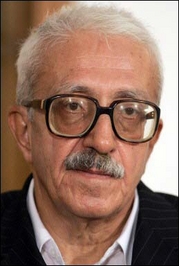 Tariq Aziz is about to go on trial for the murder of 42 people in Iraq in 1992. The verdict, as with all the so-called trials of the Ba'ath regime members, is a foregone conclusion. Aziz will be found guilty.
Tariq Aziz is about to go on trial for the murder of 42 people in Iraq in 1992. The verdict, as with all the so-called trials of the Ba'ath regime members, is a foregone conclusion. Aziz will be found guilty.
If you remember, the judge who sentenced Saddam Hussein to hang, Abdel-Rahman, quickly left Iraq shortly after the murder of the president and claimed asylum in Great Britain. Since then, little or nothing has been heard about him. But, mysteriously he returned to Iraq and will be the judge in Tariq Aziz' case.
The first time I saw Tariq Aziz on U.S. television was in the aftermath of Desert Storm. His voice was the only one that made sense of the political scene at the time. For once, I heard the truth about many items that had been twisted beyond recognition by the U.S. administration and media.
Aziz' eloquence in the English language intrigued me. Most U.S. government spokespeople could have used an elementary school refresher course in English, yet there was an Iraqi who, like Baghdad Bob, spoke better English than the president of the United States.
The last time I saw Tariq Aziz on U.S. television was a few months before the illegal March 2003 invasion. At the time, the U.S. was calling the Iraqi government a supporter of global terrorism and also began to mention the Iraq/Al-Qaida link. The accusations were believed by the U.S. public. To this day, many Americans believe Saddam was in cahoots with Bin-Laden in bringing down the U.S. trade center.
Tariq Aziz gave an extraordinary explanation of the difference between terrorism and revolution. He added that terrorism was the enemy of revolutionary movements. The TV program appeared at 3:00 a.m., so few people watched it. And, if more viewed the presentation, most would not have understood Aziz' eloquent offering.
Shortly before the 2003 invasion, many U.S. pundits said that the Iraqi people would welcome the U.S. soldiers with flowers and candy. Aziz took another view. He stated, "We will welcome the Americans in Baghdad. However, we have run out of candy and will have to substitute bullets." His assessment was far more accurate than those of the myriad retired generals who painted a rosy picture of the impending military action.
There is much information about his savage treatment in prison after he turned himself in to U.S. authorities, so I will not delve into the issue here. I would like to publish an interview with a former comrade and friend of Tariq Aziz. He is Ibrahim Ebeid, a Palestinian-American activist.
- more -
How About Those Ron Paul Presidential Odds
by Christopher Costigan
 With Republican Ron Paul still in the US Presidential Race and gaining momentum, there is talk of a potential brokered convention.
With Republican Ron Paul still in the US Presidential Race and gaining momentum, there is talk of a potential brokered convention.
Say what? Wasn't Ron Paul dead in the water?
Well, this is no ordinary political race and it shouldn't surprise too many people that someone who is still getting 8 percent of the vote in recent state primaries (16 percent in Pennsylvania) would suddenly be taken serious again.
An AOL poll conducted last month showed that much of the Northwestern states were in favor of Ron Paul over John McCain.
From the Salt Lake City Tribune:
As they have done in Nevada, Minnesota and elsewhere, a number of Utah Ron Paul backers are trying to get elected today as delegates to the Republican National Convention where, under a proposed rule change, they could be free to vote for whomever they want.
Under existing party rules, the 36 Utah delegates to the convention are obligated to vote for Mitt Romney, who won the state GOP primary with 90 percent of the vote.
the state party will consider changing its rules to release the delegates and let them vote for whom they see fit.
The proposed bylaws change comes in response to a request from Romney, after he dropped out of the race, to release his bound delegates.
That could free the delegates to support whomever they want at the Republican National Convention in St. Paul in September - a point not lost on Paul supporters.
On blogs and in e-mails, Paul backers have spread a strategy aimed at getting Paul supporters elected as delegates in order to keep Sen. John McCain from getting enough delegate support to clinch the nomination. That could force a convention fight, they argue, and give Paul a path - albeit a contorted one - to win the nomination.
"We will try to force a brokered convention - there is no way around it," writes Steve Parent on "The Daily Paul" blog.
But something else interesting happened on the way to the Convention that has helped build momentum Ron Paul's way. His new book - "The Revolution: A Manifesto" - is number one on the New York Times Best Seller list.
Upon its official release on April 30th, "The Revolution: A Manifesto" was the number one bestseller on Amazon.com and remains the number one bestseller in political books.
- more -
New Earth Rising: Hope for a New Global Dream
by Dr. Glen Barry
Sufficient and workable individual and social solutions exist for the wide range of ecological, economic, social and personal ills facing the biosphere and humanity; and together they could herald in a new era of global ecological sustainability Long predicted Earth crises -- including climate change, water shortages, abject poverty, extreme weather, food shortages, over-population, biological homogenization, energy scarcity, diminished oceans, political instability and endless resource wars -- are unfolding as expected, and are converging into a new global ecological crisis of unprecedented magnitude. The fundamental root cause of this global crisis is that humans are destroying ecosystems necessary for all life.
Long predicted Earth crises -- including climate change, water shortages, abject poverty, extreme weather, food shortages, over-population, biological homogenization, energy scarcity, diminished oceans, political instability and endless resource wars -- are unfolding as expected, and are converging into a new global ecological crisis of unprecedented magnitude. The fundamental root cause of this global crisis is that humans are destroying ecosystems necessary for all life.
Humanity has met and surpassed ecological limits. Failure to develop and implement profound personal and social change, adequate to respond to global ecosystems in mid-collapse, will have profound negative consequences for vast numbers of global citizens who are unable to meet basic needs including food, water, housing, education and health care. The task of our and all time is to find and implement sufficient solutions for the wide range of ills facing the biosphere and humanity. Ongoing arguments whether personal virtue or social enlightenment are the best strategies to promote are mute as frankly things are dire and we need lots of both.
Defining, personally embracing, and gaining social acceptance for a new global dream will require huge amounts of both personal and social change. Yet there is much to build upon, for even as the fateful hour of global ecological collapse nears, the Earth is blooming with responses to each of the symptomatic crises. From relocalized economies to community gardens, from having fewer children to better educating those we have, from driving less while living more richly where we find ourselves, by finding meaning in experience, knowledge and truth rather than competitive consumption, by rejecting ancient superstitions for an understanding that the Earth is alive and sacred -- a slowly awakening public is showing where there is knowledge and will there is hope. I see a new Earth rising.
- more -
Do the Presidential Candidates Believe that Presidents Are Above the Law?
Regarding whether President Bush and officials in his Administration committed any crimes, Senator Barack Obama told Will Bunch of the Philadelphia Daily News that he would have his new "Attorney General immediately review the information that's already there" and if that information showed that "crimes have been committed, they should be investigated" because nobody is "above the law." Bunch in his article stated that many Americans wondered whether an Obama Administration would seek to prosecute Bush officials for crimes that they may have committed. Senator Obama stated that at the present time "I can't prejudge [whether Bush officials committed any crimes] because we don't have access to all the material right now." The other presidential candidates would probably say the same thing.
However, the public record already has sufficient information that shows that President Bush and his officials committed various crimes and the presidential candidates can make judgments on these matters now.
- more -
Sitting In to Stop War Funding: Try This at Home
LONG NIGHT SITTING-IN
By Bruce K. Gagnon, http://www.space4peace.org
It was a 17 and 1/2 hour office occupation that began just after the lunch hour yesterday in Portland, Maine. We gathered outside the office of our Rep. Tom Allen's office at around 11am and began handing out leaflets and holding signs calling for an end to funding of the Iraq occupation. Just as we were ready to enter Allen's office to sit-in we learned that he had decided to vote against any more funding for the occupation unless there was a "withdrawal goal timeline" in the bill. Even though this was not exactly what we wanted, these timelines are non-binding, it was still progress and we decided to move on to the next target. The vote was supposed to happen yesterday but has been delayed because the Democrats' coalition is dissolving.
So we marched our way a few blocks to the office of Sen. Susan Collins, the Republican who has of course also voted over and again for the occupation funding. We entered the office with 20 people and jammed into her outer office waiting room. After a bit the staff of the senator invited us into their conference meeting room further inside the office. Two of her staff then asked us all to introduce ourselves and to state why we came. The statements made by the group were strong and moving and after we finished the staff promised they'd pass on the remarks to the senator and then invited us to leave. We said we needed to know how she planned to vote. The staff reluctantly replied that the senator would be "supporting the troops." We said we were not going to leave until the senator agreed to vote against anymore funding. The impass began.
- more -
Shoot, Kill, Lie, Repeat: America's New Moral Universe
by Chris Floyd
Tell me that this doesn't sound like something out of a history of Nazi tactics in World War II:
The rules [of engagement]t explicitly allowed the killing of unarmed Iraqis under certain circumstances...Specifically, the snipers were allowed to shoot unarmed people running away from explosions or firefights....Of course, it's not unusual for innocent people to run from explosions.
Didier, who has since been promoted to captain, said that "if that individual makes contact with you and then breaks contact of their own accord and disarms themselves while they are breaking contact, they are still an engageable target because they are not wounded, nor did they surrender." He explained, "They are only breaking contact so that they can engage coalition forces at a later time." In court, Sgt. Anthony Murphy, one of the snipers who was responsible for a questionable kill, testified that he interpreted this order about breaking contact so they can engage at a later time as: "Engage fleeing local nationals without weapons."
In other words, if an innocent, unarmed Iraqi runs away to seek safety from a suicide bombing, a missile attack or a gunfight -- which any human being would instinctively do -- then he is fair game to be killed by an American sniper.
- more -
Brass Brain was the equal of 100 mathematicians, weighted a mere 2500 lbs
Posted by Cory Doctorow, May 12, 2008 2:28 AM | permalink
Imagine the fearful gnashings of mathematicians in November, 1928 upon reading this account of the USGS's new "brass brain," which could "do the work of 100 trained mathematicians" in calculating tides:
The machine weighs 2,500 pounds. It is 11 feet long, 2 feet wide, and 6 feet high. Its whirring cogs are enclosed in a housing of mahogany and glass.Earthquakes, fresh-water floods, and strong winds that cannot be predicted affect the accuracy of the Brass Brain to a degree. Nevertheless 70% of the predicted tides agree within five minutes of the observed tide. The Coast and Geodetic Survey issues an annual bulletin in which it lists the forthcoming tides in 84 ports of the world. The report contains upwards of a million figures, all compiled by the Brass Brain. It has been estimated that the Brass Brain saves the government $125,000 each year in salaries of mathematicians who would be required to take its place.
Why are Christianity, Islam and Judaism all so patriarchal?
I was thinking about Mother's Day recently, and the next thing I knew, I was wondering what would explain why three major religious traditions--Judaism, Christianity and Islam--were all started by men. I know, I know; there are volumes written about the patriarchal nature of the three, and how, starting with Judaism, they stripped the ancients of a healthy belief in female deities, etc., etc., blah, blah.
But I kept thinking there had to be more to the story than what the academics would have us believe. Then it dawned on me: It's all about mothers. Both Moses and Muhammad, hereinafter referred to as M&M, suffered the absence of a nurturing mom in their formative years. (We'll get to the Christian anomaly later.)
Centuries before he was portrayed by the recently departed Charlton Heston, the Moses of mythologized history is said to have spent his earliest days bobbing down the Nile River before being conveniently rescued by an Egyptian royal family, or pharaoh's daughter, depending on which version of the story you accept. Moses (whose name in Hebrew is the more mellifluous Moshe) was dumped in the river in a baby-sized basket by his mom after a pharaoh issued an order requiring the death of all newborn Hebrew boys.
Now this is all very confounding. Why would an Egyptian Pooh-Bah, who depended on the slave labor of Hebrew tribes to build those imposing pointy structures, want to whack future workers? But I digress.
- more -
People Can Handle the Truth About War
by Helen Thomas
Some readers resented The Washington Post for publishing an Associated Press photograph of a critically wounded Iraqi child being lifted from the rubble of his home in Baghdad's Sadr City "after a U.S. airstrike."
Two-year-old Ali Hussein later died in a hospital.
As the saying goes, the picture was worth a thousand words because it showed the true horrors of this war.
Neither side is immune from killing Iraqi civilians. But Americans should be aware of their own responsibility for inflicting death and pain on the innocent.
The Post's ombudsman, Deborah Howell, said about 20 readers complained about the photo, while a few readers praised The Post for publishing the stark picture on Page 1.
Some mothers said they were offended that their children might see the picture, though one wonders whether their youngsters watch television and play with violent videos in a pretend world.
From the start of the unprovoked U.S. "shock and awe" invasion of Iraq in March 2003, the government tried to bar the news media from photographing flag-draped coffins of American soldiers returning from Iraq. A Freedom of Information lawsuit forced the government to release pictures of returning coffins.
Howell said some readers felt the photo of the Iraqi boy was "an anti-war statement; some thought it was in poor taste." Well, so is war.
- more -
CORPORATE GREED STRANGLES HEALTH CARE
by Jim Hightower
 When drug company arrogance combines with insurance company avarice, look out for an explosion of gouging.
When drug company arrogance combines with insurance company avarice, look out for an explosion of gouging.
The essential idea behind the establishment of an insurance industry was not to maximize the profits of a few corporate giants, but to create a social good for all of us – specifically to spread the costs of medical care across our whole society. If everyone pays into the system, no one has to be crushed by the cost of care when they fall sick. The notion is that we're all in this together.
But a pernicious ethic of greed has erupted within America's corporatized system, putting an unbearable cost burden on some of us who are already burdened with the worst illnesses. Drug manufacturers have been given monopolies over medicines to treat such deadly diseases as cancers and multiple sclerosis, even though these drugs were developed with government funding. In turn, the monopolists are charging exorbitant prices for these life-saving drugs.
Enter the insurance profiteers, which have now created a special "Tier Four" pricing system that forces very ill people into co-payments that can cost them more than a thousand dollars for a month's worth of crucial pills. The price can be more than folks pay for their mortgages or even more than their monthly incomes. Pay up… or do without. Which is to say: die.
- more -
ORWELL ROLLS IN HIS GRAVE
Facebook Badge
Facebook Badge
Tracking Your Bailout Money
Get it all in one daily email
Altavista Babelfish 2
FEEDJIT Live Traffic Map
Followers
Facebook Badge
Blog Archive
- ► 2009 (3420)
-
▼
2008
(2356)
-
▼
May
(511)
-
▼
May 12
(23)
- Baghdad Disney World
- 17 Stunning Auditoriums & Theatres From The Ancien...
- The ultimate ethical meal: a grey squirrel
- How Food Riots, Pricey Gas and Home Foreclosures P...
- Environmental deal sets aside L.A.-sized tract
- Leader of GOP convention quits after Myanmar ties ...
- Iraq: Will We Ever Get Out?
- Surging Into Chaos: Iraq After Basra
- Bill McKibben, The Defining Moment for Climate Change
- Candidates differ on Gitmo future
- REMINISCING TARIQ AZIZ
- How About Those Ron Paul Presidential Odds
- Watch Your Language! - The "Is-is" Epidemic
- New Earth Rising: Hope for a New Global Dream
- Do the Presidential Candidates Believe that Presid...
- Sitting In to Stop War Funding: Try This at Home
- Shoot, Kill, Lie, Repeat: America's New Moral Univ...
- Expendability
- Brass Brain was the equal of 100 mathematicians, w...
- Why are Christianity, Islam and Judaism all so pat...
- People Can Handle the Truth About War
- CORPORATE GREED STRANGLES HEALTH CARE
- ORWELL ROLLS IN HIS GRAVE
-
▼
May 12
(23)
-
▼
May
(511)


